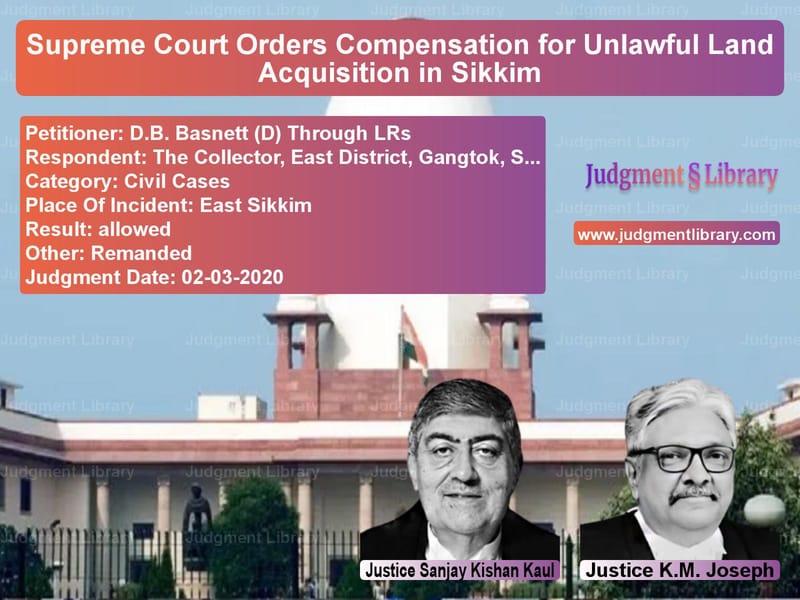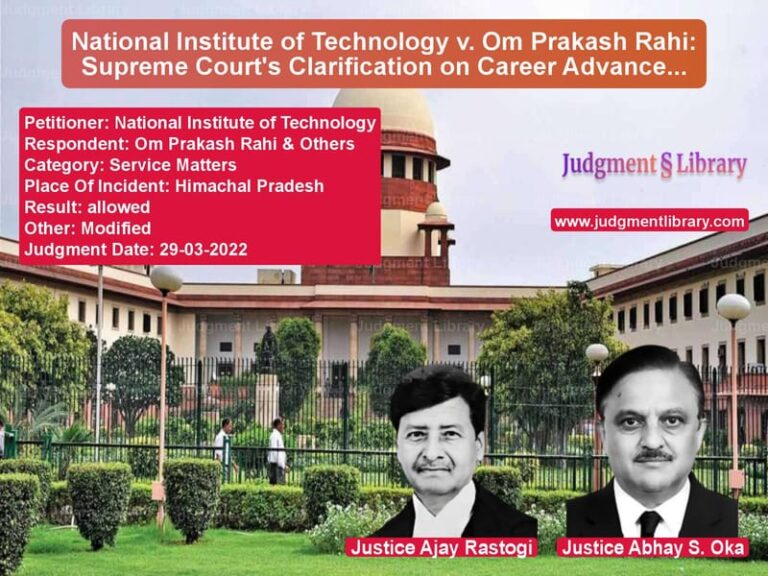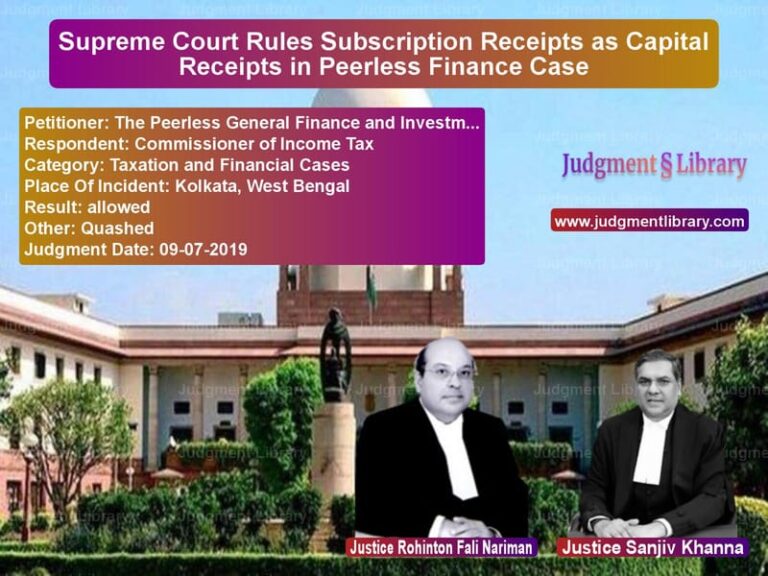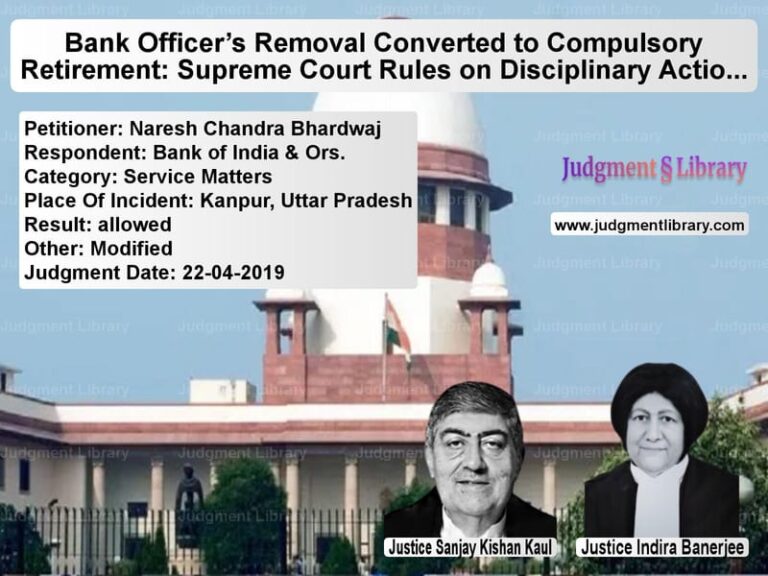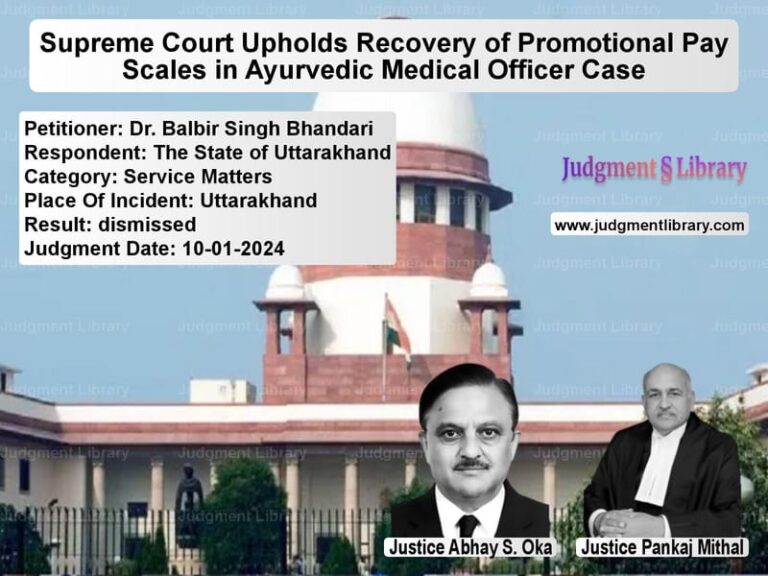Supreme Court Orders Compensation for Unlawful Land Acquisition in Sikkim
The case of D.B. Basnett (D) Through LRs v. The Collector, East District, Gangtok, Sikkim & Anr. revolves around a long-standing dispute over land acquisition by the Sikkim government. The Supreme Court had to determine whether the state followed due process in acquiring the land and whether the rightful owner was entitled to compensation.
The Supreme Court ruled in favor of the petitioner, holding that the state had failed to establish proper acquisition and compensation procedures. The Court directed the government to either properly acquire the land through legal notification or return possession to the petitioner while awarding mesne profits for illegal occupation.
Background of the Case
The dispute concerned 8.36 acres of land in Dundung Block, Sang, East Sikkim, which was recorded under two names: 1.29 acres in the name of the Maharaja of Sikkim and 7.07 acres in the name of Man Bahadur Basnett, father of the original appellant, D.B. Basnett.
In 1980, the Agriculture Department of the Sikkim government allegedly acquired the land to establish the Progeny Orchard Regional Centre. However, no official notification of acquisition was ever issued, and the state claimed that compensation of Rs.62,645 was paid to Man Bahadur Basnett.
In 2002, D.B. Basnett discovered that the government had been occupying the land without legal documentation. He served a notice under Section 80 of the Code of Civil Procedure, 1908, alleging trespass and demanding possession. When the government failed to respond, he filed a suit in the District Judge’s Court in Gangtok in December 2002.
Key Legal Issues
- Whether the land was legally acquired by the state government under the Sikkim Land (Requisition and Acquisition) Act, 1977.
- Whether the payment of Rs.62,645 constituted valid compensation.
- Whether the state had legally justified its possession of the land.
- Whether the petitioner was entitled to restitution and mesne profits for illegal occupation.
Arguments by the Petitioner (D.B. Basnett)
The petitioner contended that:
- The state never followed the mandatory acquisition process under the 1977 Act.
- There was no official notification of acquisition or opportunity for affected persons to file claims.
- There was no documentary evidence proving that compensation was paid to Man Bahadur Basnett.
- The government’s claim that it acquired the land in 1980 contradicted its own land revenue records, which continued listing the petitioner as the owner.
Arguments by the Respondents (State of Sikkim)
The state argued:
- The land was lawfully acquired, and compensation was forwarded to the Collector for payment.
- The petitioner had no valid claim as his father had consented to the acquisition.
- The petitioner had failed to challenge the acquisition within the limitation period.
Supreme Court’s Observations
The Supreme Court scrutinized the government’s claims and found that:
- No Section 4 notification (intent to acquire land) under the 1977 Act was ever issued.
- No documents proving payment of compensation were presented.
- The government continued collecting land revenue from the petitioner, contradicting its acquisition claim.
- The government’s reliance on a letter from Man Bahadur Basnett consenting to acquisition was insufficient without proof of compensation payment.
The Court emphasized:
“The burden was on the State to prove that the process as envisaged under the Sikkim Land (Requisition and Acquisition) Act, 1977, was followed and the compensation paid. Not an iota of evidence has been laid in support of these aspects.”
Final Judgment
The Supreme Court allowed the appeal, ruling that:
- The respondents failed to establish that the land was legally acquired.
- The petitioner was entitled to possession of the land.
- The state must either initiate a fresh acquisition process with proper notification or return possession.
- The petitioner was entitled to mesne profits for at least three years prior to serving notice.
- The trial court would appoint a Commissioner to determine mesne profits.
Conclusion
The judgment reaffirms that the state cannot take private land without following due process. Key takeaways include:
- The state must strictly comply with legal procedures when acquiring land.
- A mere claim of acquisition is insufficient without supporting documentation.
- Landowners have constitutional protection under Article 300A against unlawful deprivation of property.
- Mesne profits can be awarded for wrongful possession by the state.
This ruling ensures that government actions respect citizens’ property rights and reinforces legal safeguards against arbitrary land acquisitions.
Petitioner Name: D.B. Basnett (D) Through LRs.Respondent Name: The Collector, East District, Gangtok, Sikkim & Anr..Judgment By: Justice Sanjay Kishan Kaul, Justice K.M. Joseph.Place Of Incident: East Sikkim.Judgment Date: 02-03-2020.
Don’t miss out on the full details! Download the complete judgment in PDF format below and gain valuable insights instantly!
Download Judgment: D.B. Basnett (D) Thr vs The Collector, East Supreme Court of India Judgment Dated 02-03-2020.pdf
Direct Downlaod Judgment: Direct downlaod this Judgment
See all petitions in Property Disputes
See all petitions in Damages and Compensation
See all petitions in Landlord-Tenant Disputes
See all petitions in Judgment by Sanjay Kishan Kaul
See all petitions in Judgment by K.M. Joseph
See all petitions in allowed
See all petitions in Remanded
See all petitions in supreme court of India judgments March 2020
See all petitions in 2020 judgments
See all posts in Civil Cases Category
See all allowed petitions in Civil Cases Category
See all Dismissed petitions in Civil Cases Category
See all partially allowed petitions in Civil Cases Category

